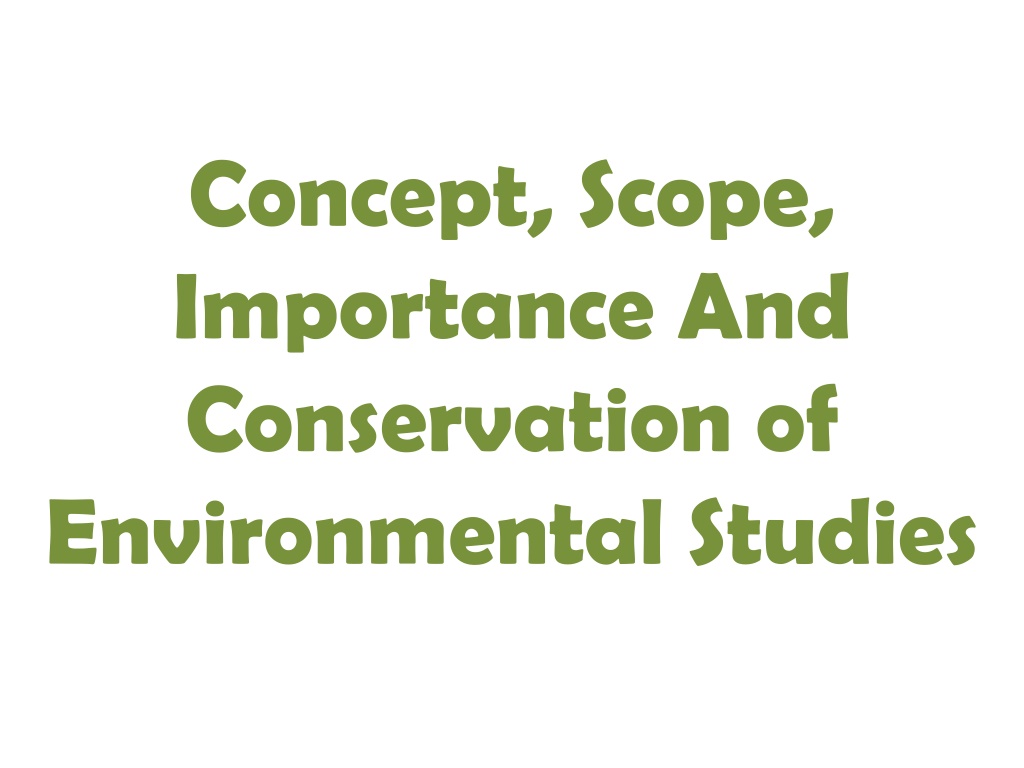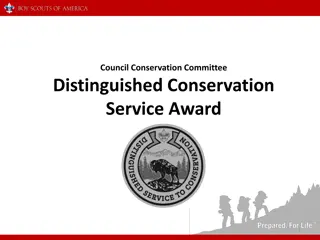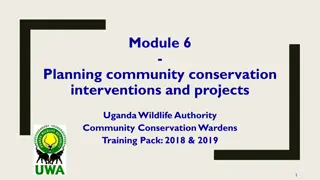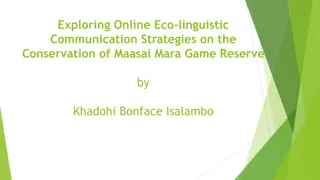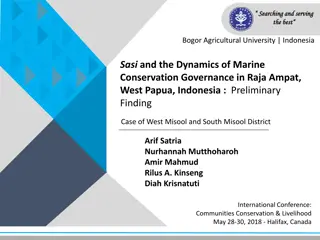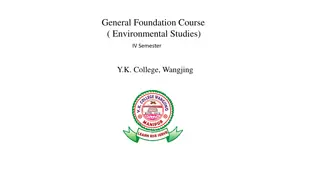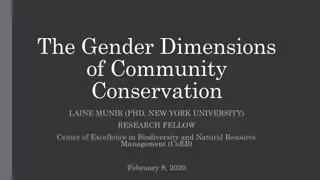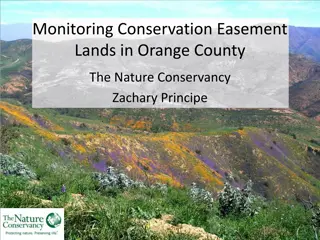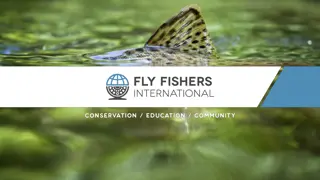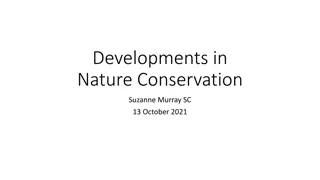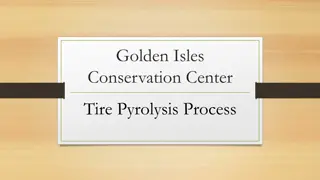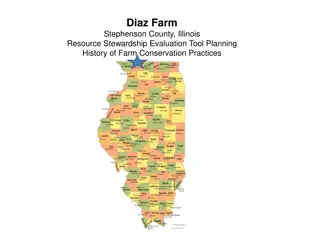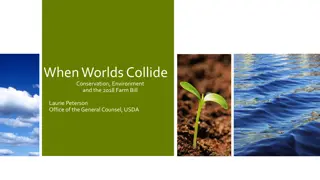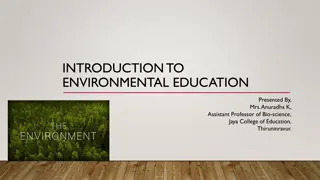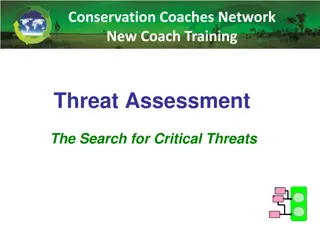Understanding Environmental Studies: Concepts, Scope, Importance, and Conservation
Environmental studies encompass the broad understanding of the environment, including its definition, ecology, ecosystems, environmental segments, and the multidisciplinary nature of environmental science. The scope and importance of environmental studies highlight the interconnectedness of living organisms with their surroundings and the need for conservation efforts to sustain a healthy environment for future generations.
Download Presentation

Please find below an Image/Link to download the presentation.
The content on the website is provided AS IS for your information and personal use only. It may not be sold, licensed, or shared on other websites without obtaining consent from the author. Download presentation by click this link. If you encounter any issues during the download, it is possible that the publisher has removed the file from their server.
E N D
Presentation Transcript
Concept, Scope, Importance And Conservation of Environmental Studies
DEFINITION OF ENVIRONMENT The word Environment is derived from the French word Environ which means surrounding . Our surrounding includes biotic factors like human beings, plants, animals, microbes, etc and Abiotic factors such as light, air, water, soil, etc. The dictionary meaning of the environment is the particular surrounding in which living and non-living things exist; or scientifically, the environment is the area or surrounding in which the living organisms live and interact with the non-living things as well as living things in the particular area perform their important activities of life. The organism are supported by Abiotic components of the earth. This environment has been changed by the man since the new dimensions of industrialization and advanced technologies came into existence.
Definition of Ecology and Ecosystem Ecology:The word ecology, derived from the Greek word: Oikos meaning habitation, and logos meaning discourse or study, implies a study of the habitations of organisms. Ecology was first describe as a separate field knowledge in 1986 by German Zoologist, Ernst Haeckel, who invented the word Oeckologie . Ecosystem: An ecosystem is a large community of living organisms (plants, animals, and microbes) in a particular area. The living and physical components are linked together through nutrient cycles and energy flows. Each ecosystem has its own community.
Environmental Segments The natural environment consist of four interlinking systems namely, the atmosphere, the hydrosphere, the lithosphere and the biosphere. These four systems are in constant change and such changes are affected by human activities and vice-versa.
Environmental Science as Multidisciplinary Science Environmental studies deals with the study of the atmosphere, the land, the oceans and the chemical cycles that flow through the physical and biological systems. Modern days environmental sciences is increasingly becoming multidisciplinary in nature of studies. Environmental sciences is closely related to other subjects like life sciences, botany, zoology, biology, biodiversity and other sciences like soil science, earth science, politics, sociology etc. Ecology:As a science, developed essentially as a branch of biology, dealing with habits of behavior of living organisms and their adjustment with their surroundings or environment. Human ecology developed as a branch of social sciences, which focused on the behavior of human beings in relation to their natural and social environment. Economics can play a significant role in finding solutions to environmental pollution.
Scope and Importance There is a need to focus attention on environmental sciences to maintain the ecological system and to keep pace with future sustainable life of the country. 1) Sustainable Development: The main aim of environmental science is to achieve sustainable development. As Mahatma Gandhi observed that Nature is bountiful, but not unlimited. It has enough to fulfill human needs but It can not satisfy human greed. If we accept the concept of sustainable development, we must accept that approach to development which does not destroy, not degrade or deplete natural resources, but which conserve, maintain and upgrades them.
2) Conserve life supporting system: After two or three decades of hectic development, wisdom has started drawing on humanity that mindless pursuit of material prosperity is not the way to happiness. Wealth does not necessarily lead to welfare. Moreover, development for short term gains can have dangerous consequences in terms of destroying, depleting or degrading environment. This can threaten the life supporting system of nature on which the entire development is based.
3) Human system-Part of eco-system 4) Control Pressure of population 5) Achievement of Environmental Security and Stability: The role of environmental science is to achieve environmental security and stability. While harnessing natural resources with the help of modern technology for meeting these needs, we have to take great care that our development plans are consistent with environmental security and stability. 6) Conservation of forest Resources 7) Conserve biomass 8) Grazing Lands 9) Conservation of water resources
10) Environmental Impact Assessment: For every project it is necessary to consider not only the benefit-cost ratio as in the past, but also the environmental impact assessment. 11) Appropriate Technology: It is necessary conserve the natural resources. A number of technologies that are needed for forest, water and soil conservation and containing the impact of industrialization and urbanization on environment. 12) Non-conventional sources of energy: All development is based on energy. Conventional sources of energy like fossil fuels such as coal, gas, oil, are non-renewable. It is, therefore, necessary to develop technology for generating non-conventional source for energy generations such as solar energy, wind power, tidal energy, etc. Smokeless chulahcan also save energy by increasing fuel efficiency and improve environment.
Environmental conservation We only have one planet and we should all to ensure that its protected by combining our modern way of living with a deeper respect and understanding of what nature provides. Environmental conservationists understand that the way we live is a reflection of how we feel about the natural world, and our every day habits show how much we truly value all the things that the earth gives us. Environmental conservation is an umbrella term that defines anything we do to protect our planet and conserve its natural resources, so that every living thing can have an improved quality of life. The environment is vital to our well-being and every element should be protected.
CONTINUED Every part of environment including the trees, the oceans and the soil. The trees help us to breathe also isolates green house gases that would cause the earth to heat up more quickly. Trees hold soil in place and naturally filter water that has been absorbed into the ground. The trees, sea and the ground, these three elements are necessary for our existence, and there are still more parts of nature that we need to protect. Conserve by using less energy and embracing alternative energy sources. To promote alternative energy sources,
